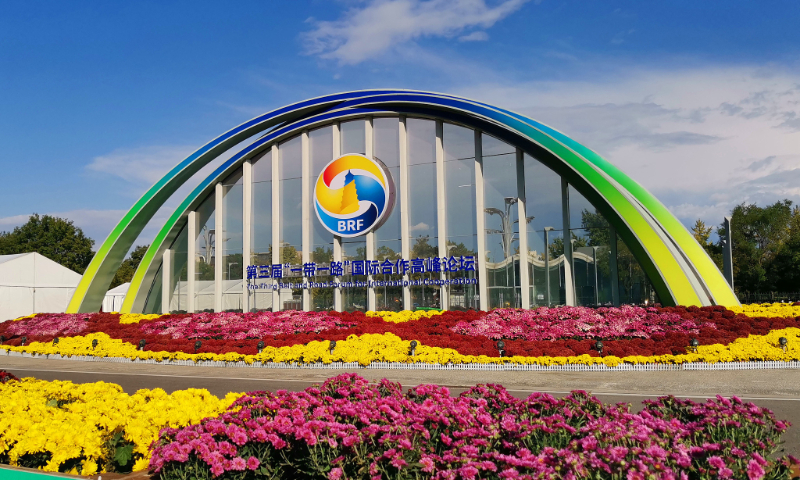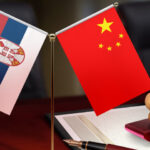On the first day of the third Belt and Road Forum for International Cooperation (BRF), over 1,200 representatives from more than 80 countries and regions have taken on what some describe as a journey of “opportunity hunting,” eyeing establishing new business networks under the Belt and Road Initiative (BRI) – the world’s largest platform for international cooperation- to inject certainty into their businesses in an uncertain world and make joint contributions to global economic recovery.
More than 300 representatives from China and abroad signed agreements at this year’s Belt and Road CEO Conference on Tuesday, the Global Times learned. The deals, covering artificial intelligence, biomedicine, modern agriculture, as well as financial services, hit a record in terms of both the number of deals and the value of contracts.
Industry insiders said that the substantial outcome is “voting with their feet” that underscores a culmination of the confidence exhibited by foreign entrepreneurs on the miraculous achievements of the BRI in the past 10 years, and their bullish outlook on the new stage of BRI development, which is set to see broader scope of cooperation. It also mirrors their firm belief in China’s reputation as a responsible global power that, in building a path to joint prosperity, “leaves no one behind.”
The forum serves as a crucial platform for China to elaborate on its unswerving commitment to opening-up as well as multiple policies to stabilize economic growth and attract foreign investment. On the foundation of the new chapter of global growth opened by Chinese initiatives and proposals in the past decade, foreign executives expect that the country, at a time of global geopolitical challenges and regional tensions, will play a more “decisive” role in bridging development gaps and continue acting as the bellwether in fostering a more connected global economy.
Substantial results
Chinese Vice Premier He Lifeng said at the opening speech of the CEO Conference that the gathering of more than 1,000 representatives from business circles of various countries, on the occasion of the 10th anniversary of the joint construction of the BRI, is of great significance to promote prosperity of global development. The CEO Conference is also the opening event of the BRF.
With the joint efforts of all parties, the BRI has expanded and extended around the world, profoundly changing the pattern of global industrial and supply chains, promoting the optimal allocation of resource factors, and becoming a development belt that benefits all countries, and “a road to happiness” that bring happiness to people of the world, He said.
At the CEO Conference, China initiated the Beijing Declaration for global entrepreneurs, calling for efforts to adhere to opening and cooperation, deepening connectivity cooperation, adhering to green development, promoting cooperation on the digital economy, as well as adhering to lawful operation and fulfilling social responsibility.
“We welcome business communities from more countries to join the initiative, jointly create more opportunities for common prosperity under the initiative, and work together to broaden this ‘road to happiness’ that benefits the world,” the declaration said.
Mario Rendulic, President of the Chinese Southeast European Business Association, told the Global Times that the forum “offers opportunities to establish new connections, explore potential collaboration and expand professional networks.” It marks the third time that Renduli? has participated at the BRF, based on the progress and experiences from the first two events.
Rendulic disclosed that his company, Croatia-based project contractor Tehnika d.d., will reach agreements with Chinese companies, without giving more details.
Rupert Varnai, CEO of Cathay Partners, told the Global Times on the sidelines of the CEO conference on Tuesday that “as a business advisor, each bridge, each road, each highway, or each new project that has been constructed, it means legal work. It means taxation, it means coordination of the different disciplines, intellectual property, and everything else is involved,
“So for me and the biggest fan of the Belt and Road…the more successful [BRI] means more work, more advisory work, more cooperation for us,” Varnai said. Varnai comes from Hungary, the first European country to sign a BRI agreement with China.
While the enthusiasm of foreign representatives from BRI participants offers a fresh glimpse into its wide recognition among the international community, it is also palpable that more companies from countries that have not joined the BRI are attending this year’s forum, drawn by fruitful cooperation achievements in the past 10 years.
Mansoor Nadeem Lari, CEO of the India-based Silk Route Trade and Industry Development Corp, a trade facilitation organization, told the Global Times that Indian companies see “huge” opportunities to cooperate with Chinese businesses, though the country has yet joined the China-proposed initiative.
He highlighted several areas in which Chinese and Indian firms could collaborate more in the next stage of BRI development, such as high-tech manufacturing and trade in services and tourism, which could harness India’s expertise in knowledge and innovation.
“We’re constantly seeking attractive investment opportunities,” Rani Jarkas, chairman of Swiss financial group Cedrus Group, told the Global Times on the sidelines of the CEO Conference on Tuesday, talking about his presentation at the forum. He noted that his company’s business activities are strongly aligned with the major policy goals of BRI.
Jarkas, a first-time participant, said he is very much looking forward to the summit to bring more cooperation opportunities for Chinese and foreign enterprises, leading to benefits for more people.
Observers said that the array of deals inked at the CEO Conference has sent a resounding signal over foreign companies’ unwavering confidence on the prospects of BRI cooperation. It also proves that the China-proposed initiative responds to global calls and aligns with the global desire for common development.
“The BRF is being held when geopolitical power wrestling is threatening the stability of the world, and similar initiatives proposed by Western countries were proved to be empty talk. At this time, the BRI, which rejects a zero-sum game mindset and delivers real benefits, carries prominent significance,” Zhou Rong, a senior researcher at the Chongyang Institute for Financial Studies at Renmin University of China, told the Global Times on Tuesday.
And that means a “broader, more inclusive road” for BRI global cooperation after a decade of development, according to Zhou.
In recent years, the digital economy, intelligent manufacturing and the green economy have been developing rapidly, representing a new trend in world economic and technological development. Cooperation between China and partner countries in these fields has unlimited potential and bright prospects, Vice Premier He Lifeng said.
Among the “record deals” signed at the conference, the Global Times observed that “green and digital” are two of the key words, and these also represent the future trends of the BRI.
In addition to deals reached between private companies, a list of inter-governmental agreements between China and Hungary and China and Chile were inked on Tuesday.
A ‘decisive’ role in global growth
Many foreign entrepreneurs, who deem the BRF as a crucial gathering to gauge China’s policy stance on various issues, said that after deep exchanges with Chinese peers, they have been impressed by the country’s vibrant economic drivers, ranging from a “strong domestic market, technological advancements and manufacturing capabilities to its irreplaceable position in international trade.”
“Chinese authorities have implemented various measures to stimulate domestic demand, promote innovation, and support economic growth,” Rendulic said, voicing his confidence in China’s resilient economic recovery this year.
According to foreign representatives, some economists and foreign media outlets, ahead of a third-quarter GDP release scheduled on Wednesday, had underestimated their predictions on the potential of the world’s second-largest economy.
Varnai noted that at the moment, no crisis can be gone without some challenges or impacts, but he believes the Chinese economy will be “on the uphill.””The pessimistic predictors need to look back in Chinese history where there were a lot of very similar situations and China overcame all these adversities and problems,” Rendulic noted.
Jarkas said that the combination of the Chinese government’s highly effective policies and the hardworking nature and ingenuity of the Chinese people will ensure that the country’s social-economic objectives are met.
In his opening speech, He noted that the current momentum of international trade growth is insufficient, and as a major regional country in the global goods trade, China is willing to expand market opening with other countries, build more trade cooperation platforms, improve customs clearance convenience, inspection and quarantine, logistics and transportation, cross-border settlement and other policies and measures to promote trade, which will see a balanced and win-win development.
Observers said that the BRF, followed by the China International Import Expo in November and the China International Supply Chain Expo in late November and early December, send an unmistakable signal on China’s commitment to high-level opening-up.
As China’s opening-up further gears up, representatives from foreign companies noted that their businesses have received a lot of benefits. For example, Cedrus plans this year to invest 1 billion yuan in the development of healthcare and innovative technologies in China, to tap into the market potential.
According to a report issued by the China Council for the Promotion of International Trade, over 80 percent of foreign enterprises expect their return on investment will increase or stay flat this year.
“The Chinese government is doing an amazing work in welcoming foreign investment. We hold a positive outlook on China as an investment destination. We believe that China will play an even more vital role in the world economy and continue to act as the locomotive for the global economy,” Jarkas said.
According to an IMF report, China is set to account for around one third of global growth in 2023, giving a welcome lift to the world economy.
(Global Times)




